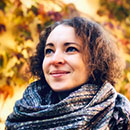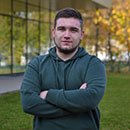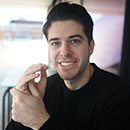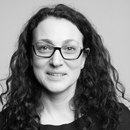Resilience in the Face of War: Ukrainian Researchers Investigate AI Fairness
Air raid sirens sound off on a weekly basis. Sporadic missile attacks strike residential buildings, killing innocent civilians. These are the grim conditions under which researchers at the Ukrainian Catholic University are working – at all hours of the day – as they investigate fairness and accuracy in artificial intelligence (AI) systems.
 Tetiana Zakharchenko, senior lecturer at Ukrainian Catholic University, and Nazarii Drushchak, graduate student in data science, have been faced with this horrific reality since Russia invaded their homeland on Feb. 24, 2022. Drushchak lives in Lviv, a city in western Ukraine where thousands of people have temporarily settled. Zakharchenko, a Kyiv native, moved farther west before the war began.
Tetiana Zakharchenko, senior lecturer at Ukrainian Catholic University, and Nazarii Drushchak, graduate student in data science, have been faced with this horrific reality since Russia invaded their homeland on Feb. 24, 2022. Drushchak lives in Lviv, a city in western Ukraine where thousands of people have temporarily settled. Zakharchenko, a Kyiv native, moved farther west before the war began.
Drushchak and Zakharchenko have balanced blackouts and empty classrooms while teaching elementary school students how to code. They are both authors of “The Possibility of Fairness: Revisiting the Impossibility Theorem in Practice,” a research paper supported in part by the Northwestern Center for Advancing Safety of Machine Intelligence (CASMI).
Andrew Bell, New York University (NYU) PhD student in computer science, presented the paper’s findings at the Association for Computing Machinery Conference on Fairness, Accountability, and Transparency (ACM FAccT) on June 12. The paper’s other authors are Lucius Bynum, PhD student at the NYU Center for Data Science; Lucas Rosenblatt, NYU PhD student in computer science; and Julia Stoyanovich, associate professor of computer science & engineering and of data science at NYU and director of its Center for Responsible AI.
"Tanya and Nazarii were essential collabators for this work and deserve high praise regardless, but given the circumstances, it's all the more incredible," Bell said. "It was an honor and truly inspiring to be a part of this collaboration."
“They've been superstars,” said Stoyanovich, principal investigator for the CASMI-funded project, “Incorporating Stability Objectives into the Design of Data-Intensive Pipelines.” She started a fully remote research program with Ukrainian Catholic University last summer.
 “We've had meetings with the Ukrainian collaborators where they have no power, and they’re working off of a generator by candlelight,” Stoyanovich said. “They still deliver amazing results. They've been really resilient. I'm happy there was an opportunity for my students and me to help them keep a sense of normalcy.”
“We've had meetings with the Ukrainian collaborators where they have no power, and they’re working off of a generator by candlelight,” Stoyanovich said. “They still deliver amazing results. They've been really resilient. I'm happy there was an opportunity for my students and me to help them keep a sense of normalcy.”
The feeling is mutual, Zakharchenko said. Ukrainian Catholic University researchers had weekly meetings with the NYU team over several months, allowing them to focus on their work instead of the war.
“Whatever was happening in our cities, we knew we had a meeting so we could meet people from outside and work on something important,” Zakharchenko said. “It gives us a lot of strength during this time.
“We appreciate all the ways people are helping us. It’s really important because we have an opportunity to do science in these conditions,” Zakharchenko added.
It hasn’t always been easy. Electricity outages have forced Drushchak to participate in virtual meetings in the dark. He also wasn’t able to attend ACM FAccT in Chicago because Ukraine declared martial law in response to the Russian invasion, forbidding most men ages 18-60 from leaving the country.
The war has challenged Zakharchenko and Drushchak to manage their time wisely. A reliable internet connection is rare in Ukraine.
“The problem is 24 hours, seven days a week,” Drushchak said. “When we know that we have some meetings or we need internet, we try to find a place that has an electric generator that can help us. It can be like two hours with electricity, then eight hours without, then another two hours with electricity. We have a chance to charge our laptops and share our internet using a mobile connection.”
Drushchak works as a data scientist for SoftServe, a software development and consulting company that provides a bomb shelter to the community.
Zakharchenko and Drushchak are motivated by the research they are doing. Drushchak wants to spend more time investigating how generative models like ChatGPT can generate fair outputs. Zakharchenko said her love for research causes her to work a little too much – at least, according to her husband.
“For example, I was writing to Nazarii at 11 pm: ‘Are you sleeping? No? Can we jump on Zoom? I have a crazy idea.’ Nazar would say, ‘Come on (begrudgingly). Okay, for sure. Let's do it,’” Zakharchenko said.
The Ukrainian researchers said it’s crucial to keep working in the country to educate the next generation and to help Ukraine rebuild. Drushchak is confident Ukraine will win the war and encouraged people to visit when the conflict is over.
“It's a beautiful country,” he said. “It would be cool to have an international conference in Ukraine after our victory.”
